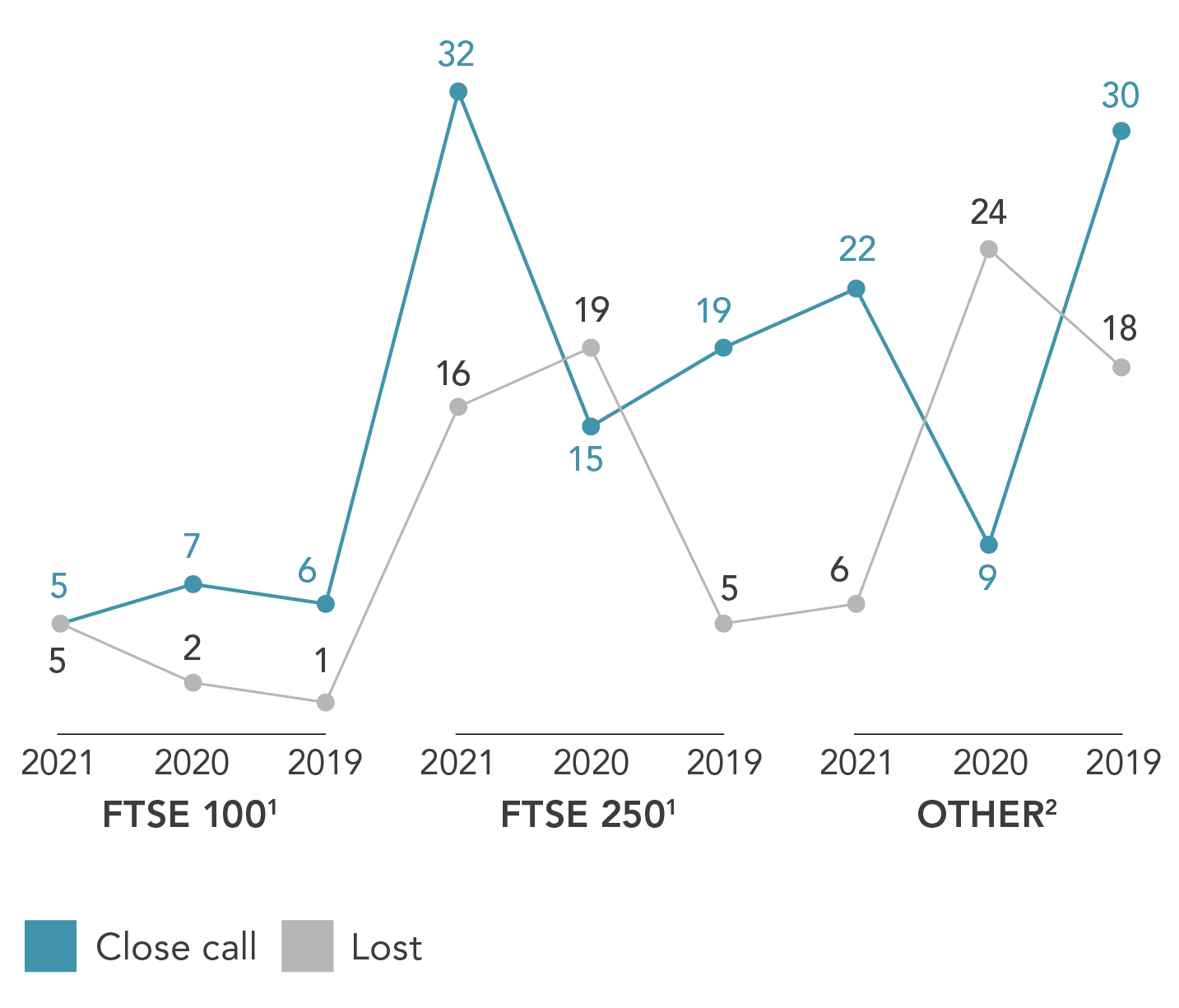The concerns of shareholders over dilution of their shareholdings remains a key issue, with resolutions approving the allotment of shares pre-emptively accounting for the majority of lost and contentious resolutions.
Number of lost resolutions/close call votes*


 *Vote is within 10% of required majority
*Vote is within 10% of required majority
It is noticeable that overall the number of lost resolutions is lower than in the 2020 AGM season whereas the number of close call resolutions has increased. The decrease in lost resolutions could be due to action taken by companies during the last year to understand the results and engage with shareholders over difficult issues.
Number of lost resolutions/close call votes*

* Vote is within 10% of required majority
+ 9 of these resolutions were at one company where particular circumstances at this company led to this result
Remuneration concerns continue
It may not be surprising that the number of close call resolutions connected with executive remuneration has increased. Investor relations bodies were quite clear in setting out their concerns over awarding bonuses or salary increases to directors if they were receiving financial help from the government or the company performance was poor due to COVID-19. Shareholders did not hesitate to vote against remuneration reports and policies where this was the case.
Resolutions that receive the lowest number of votes in support

Shareholder concerns
As part of our analysis, we monitor those resolutions which receive the lowest number of votes ‘for’ even though they are passed. This is effective in highlighting areas of concern to shareholders. Over recent years, there has been an increase in the number of director resolutions and resolutions connected with remuneration which receive the highest votes ‘against’ although this decreased slightly in both instances in 2021.
Two other resolutions in particular are of interest this year due to the relatively large increase in the number of companies receiving the lowest votes ‘for’.
Authority to allot non-pre-emptively resolution
The number of authority to allot pre-emptively resolutions receiving the lowest number of votes ‘for’ increased from 57 in 2020 to 78 in 2021.
Since the introduction of new guidelines by the Pre-Emption Group in 2016, it has become routine practice for the majority of companies to request authority to allot 10% of issued share capital pre-emptively, whereas this was used to be 5%. It may be that shareholders feel that companies are not paying enough attention to the qualifying aspect of applying for the additional 5%, which is that it should be allocated to a specific acquisition or capital investment.
Resolutions connected with the appointment or remuneration of the auditor
The number of auditor resolutions receiving the lowest number of votes for increased from 11 to 20.
There has been disquiet for some years over the operation of the audit market, in particular length of tenure of some auditors and auditor independence. The government is currently consulting on changes to be made to legislation and regulation concerning auditors following the three major reviews carried out into different aspects of the audit market. It may be that shareholders are now increasingly using their voting power to voice concern where a company’s auditor has been in post for a long period of time or where there are other concerns over the auditor’s independence and the company has failed to take action.
About the statistics
- Unless otherwise indicated, statistics quoted in this article are taken from research undertaken by Equiniti’s AGM team. The statistics include all companies in the FTSE 100 and FTSE 250 indices as well as Equiniti clients outside of these indices (referred to as other/smaller). All 2021 statistics are for the 2020/21 year ended on 31 July 2021.
- Statistics based on Equiniti clients only.
Preparing For Your AGM
At EQ, we are here to support you and ensure the successful planning and implementation of every aspect of your AGM.

